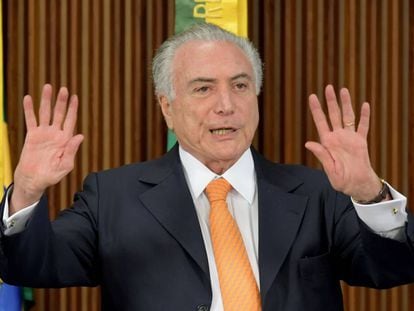Brazilian Senate ushers in 20-year social spending freeze
The measure, the toughest cut in recent history, has prompted a series of demonstrations
Brazil has passed the most severe budget cut in its recent history. The bill, PEC 55, the crown jewel of President Michel Temer’s legislative plan, is the harshest spending-cut measure passed since the country ratified its 1988 Constitution. The constitutional amendment, which will drastically reduce public expenditure for the next 20 years, provoked a series of demonstrations throughout the country over the last few weeks as lawmakers debated its merits.

The Senate passed the law with 53 votes in favor, just four votes more than required to amend the Constitution, while 16 senators voted against it after more than a month and a half of missteps and controversy.
Starting next year, the amendment will limit the federal budget of the next five legislatures. The government will only be allowed to increase spending based on inflation. The mammoth Brazilian bureaucracy will not be able to raise salaries for public servants, hire new employees or provide fiscal incentives if it does not meet its goals.
Though the law will not affect the most sensitive areas – education and healthcare – until 2018, it remains a sort of existential dilemma for the Brazilian government. Until now, the Brazilian Constitution only provided a minimum threshold for public expenditures, not a cap.
The close vote on the bill reflects an undeniable fact: the Michel Temer administration, which took office in August after the impeachment of former President Dilma Rousseff, lacks the authority it expected to have. The executive tried to present himself as a fiscally reasonable and responsible leader, a sort of bitter but necessary medicine to rouse the country out of the economic crisis.
Yet, his administration faces constant corruption allegations that involve more and more of its Cabinet members. And by the time lawmakers voted on the bill, his popularity had dwindled to 10%, according to the last poll by Datafolha, from an admittedly low record, a mere 14%, when Temer took office in late August.
Several senators who had already thrown their support behind the bill have distanced themselves from the president. “We didn’t have to win in the penalty shoot-out,” said Romero Jucá, the leader of Temer’s coalition in Congress. “We didn’t win 5-0 but we won 5-3. The most important thing is that we won,” he added in consolation.
Before the vote, the small minority in parliament warned that it would bring an appeal before the Supreme Court but all of its efforts to do so have failed. Still, the left insists that the new law is unconstitutional. “It is unreasonable: the people’s Constitution has stopped protecting the people,” said Jorge Viana, a member of the Workers Party (PT).
English version by Dyane Jean François.
A government already tainted by corruption
When Michel Temer took over after the impeachment of Dilma Rousseff earlier this year, one of his objectives was to discredit her Workers' Party, accusing it of being mired in corruption and selling himself and his administration as the alternative. Since then however, his Cabinet has also been the target of accusations of graft.
The culture minister resigned in November over a property deal. The president of the Senate, a member of Temer’s PMDB party, was sacked over corruption allegations. Meanwhile, the latest revelations from the ongoing investigation into the Lava Jato graft network centered on state oil company Petrobras, point to links with Temer and other members of the government.












































